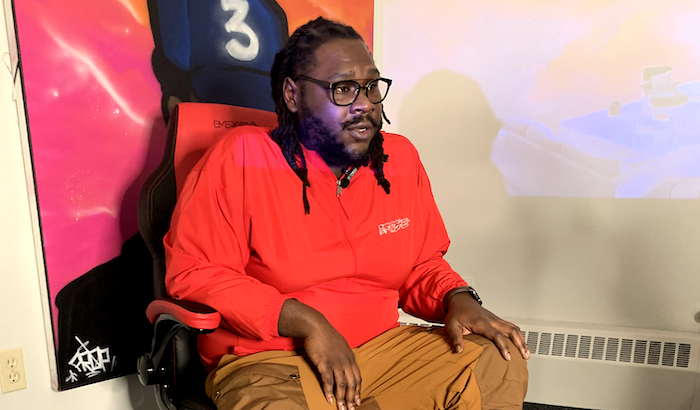
Video: “I’m a big fan of nostalgia … I was looking at things that have impact and things that were dope, but also things that lack diversity.”
One way or another, if you are in the Mass cannabis industry, there’s a solid chance that you will end up partnering with Gary Perry.
You might work at a dispensary that books one of his Tiny Trap Concerts to harness local energy and culture. Or maybe you’re a top-tier cultivator looking for a brand to collaborate with on prerolls; in that case, you’d likely connect with Perry through his company TerpBae.
And if you like to puff, then perhaps you have already linked with him directly on social media. He interacts around the clock on Instagram where he is known as Terpene Papi, and even has a mailbox for customer feedback.
Perry didn’t build his robust network of friends, followers, suppliers, and buyers overnight. Nor did he just learn the art of outreach in the past few years. Those skills come in part from his experience working as a supervisor at the Home for Little Wanderers and also from his time at Cambridge City Hall, where he served as a community liaison, setting up job programs and creating other opportunities under Mayor Denise Simmons.
“I came into Cambridge cannabis already understanding the Cambridge landscape,” Perry said in a recent interview with Talking Joints Memo. In 2016, he approached Sira Naturals to help the company communicate along the same channels that he was familiar with from working on the municipal side—fostering connections between elected officials, community members, and the business and nonprofit sets as well. But the transition was difficult, he said, and differences in opinion and priorities ultimately led to him losing the job.
Meanwhile, Perry recalled, “There were things happening that I just wasn’t picking up on immediately. Then, as I started to pay attention, I started to see these things”—things, he said, like people of color coming into the store and waiting for him—the lone Black budtender at the beginning—and not wanting to transact with others.
In 2018, Perry went to work at Rev Clinics, then called Revolutionary Clinics, which is also largely a Somerville and Cambridge-centric operation. There, he wrote the job description for and filled a community outreach position, and began encouraging the company to fund local programs and proactively engage with people and government. By 2019, he’d become the company’s DEI coordinator, but parted ways almost a year after Rev Clinics sued the City of Cambridge to block rules which put Rev Clinics (and others) behind Social Equity Program applicants in the queue for adult-use licenses.
Perry never looked back. He’d been in the first cohort of the Cannabis Control Commission’s Social Equity Program, and his interests were shifting toward stepping out on his own.
“The Social Equity Program on day one did not put a big emphasis on ancillary businesses,” he said. Perry wasn’t interested in becoming a licensed grower, seller, or manufacturer like most of his classmates. His focus was on building brands. He continued: “We’re providing services to cannabis companies and the community, but it’s a level of marketing that their marketing teams [at dispensaries, manufacturing companies, etc.] aren’t even connected to in regards to cultural adjacency, in regards to bringing in a diverse dollar, or making an establishment stand out versus the store that’s selling the exact same thing 10 minutes away. What memories are you creating that encourage people to come back to you?”
For his first endeavor to help make those memories, in 2020, Perry founded Tiny Trap Concerts.
“I was trying to figure out what my next move was going to be,” he said. “I had just left [Rev Clinics] and I was just looking for something given the amount of time, space, and access I had.” By 2021, the nation was slowly emerging from the COVID-19 pandemic, and most events, if they were happening at all, required formal protocols including vaccination cards. Perry said, “The only places that weren’t listed as venues were dispensaries, because no one was really seeing dispensaries as venues at that time.”
But he did.
“I spent a lot of time in these places, I knew what kind of space there was, how many people could fit in them, and exactly what that could be. A lot of them actually were event spaces that were converted into dispensaries. And so I realized that we had an opportunity to pitch something to the cannabis industry that helped them in a way that gave them a lot more cultural relevance then what they were moving with. People can get weed anywhere, and [these businesses] weren’t getting the attention that they wanted.”
The goal was to help local artists from New England get more of a push that doesn’t come from the established gatekeepers of Boston music, and it has created serious buzz over 13 installments so far. Each act gets paid three-hundred bucks and an ounce to perform three-to-four songs; for many of them, even some who have a lot of followers and are doing big numbers online, it was their first paid show.
“There’s just so much talent in Massachusetts,” Perry said. “With the amount of dispensaries that are not in the city, it’s an opportunity to get them foot traffic, and to help push some hometown heroes.” One standout bill was a Juneteenth event at Apothca in Lynn. He recalled …
“There were so many reasons why it shouldn’t have gone right. … At the last minute, right before the event, they told us that we can no longer do the performances in the dispensary and had to do it outside in the parking lot. They were saying their acoustics were bad, and things that we should have known ahead of time, but we were building the plane as we were flying it.” They pulled it off, though, and packed the spot thanks to “Lynn heroes like Estee Nack, Nyeusi Loe, and Al Divino,” Perry noted.
With TTC drawing heads and eyeballs online, the natural concurrent move was into the weed market. By that point, Perry had been plotting and paying attention for years: “I started to realize that there’s a huge amount of cannabis retailers and operators and a lot of brands, but not many of those brands were reflective of the people who spent all that money. Every brand is, This is me on a beach, or, This is me at work, or, This is me with pink hair. It just started to get outlandish, and I realized that the only brands that had any representation at all are all celebrities and people who have no real care about [anything beyond the profit] once they got on the plane.”
He continued, “I started to tap in with the folks who do all of the buying, [and asking], What are you buying the most of? And it’s always pre-rolls. I started to look at companies who are growing really good flower.”
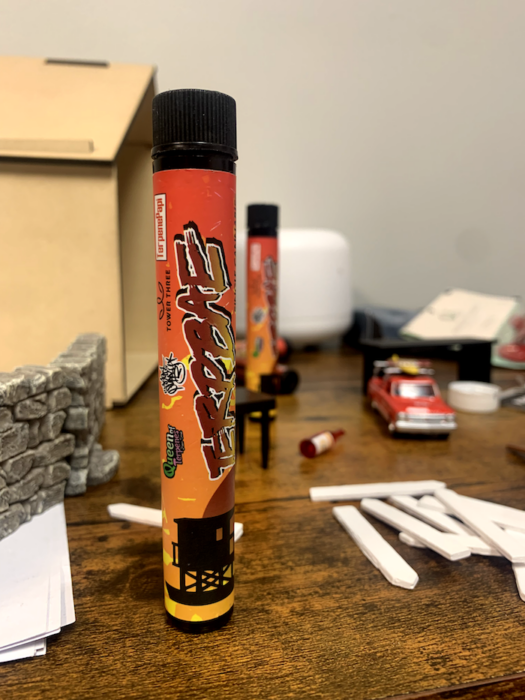
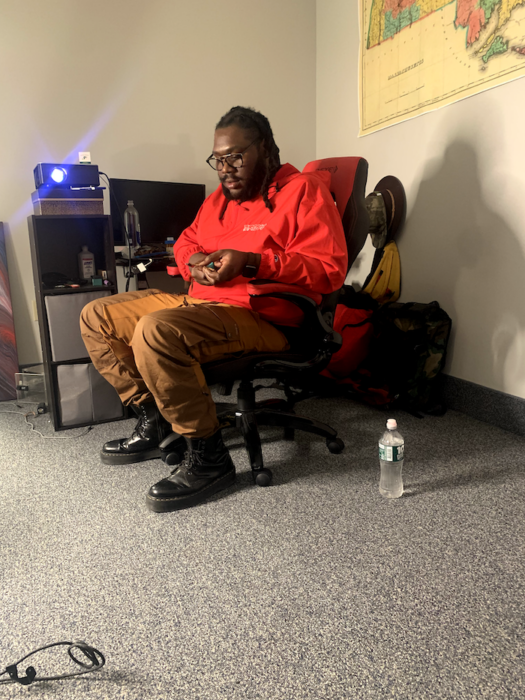
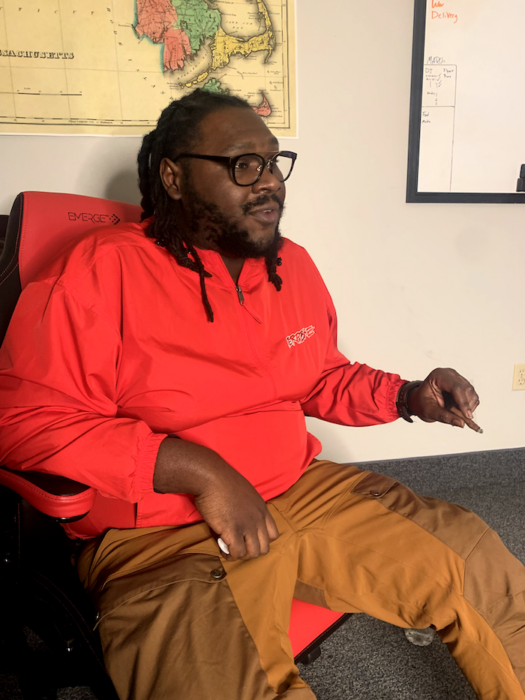
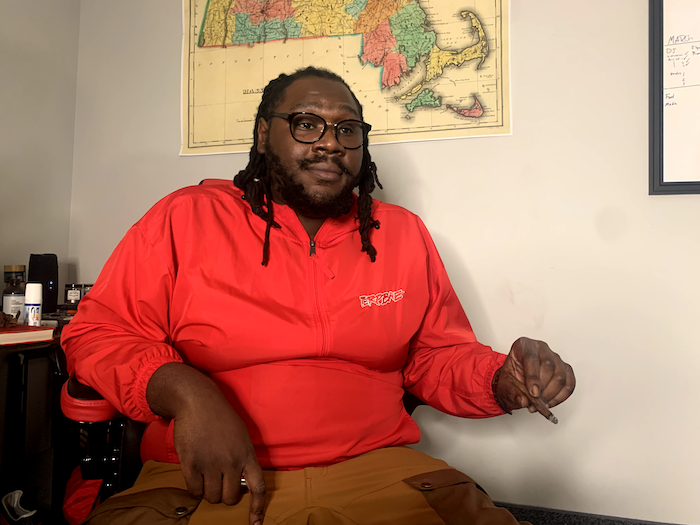
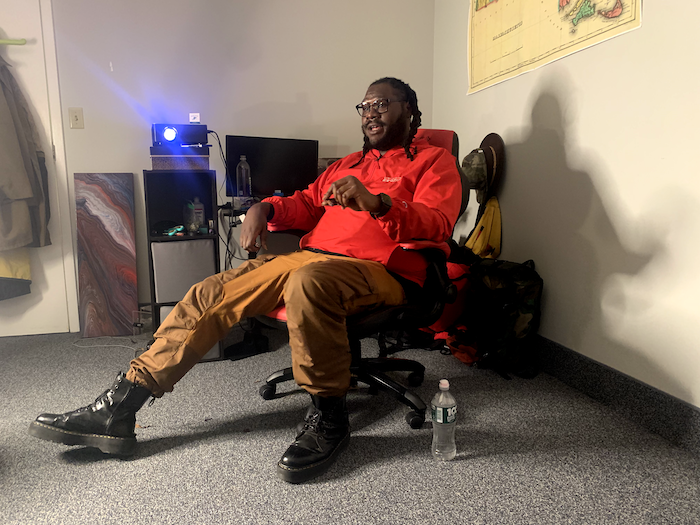
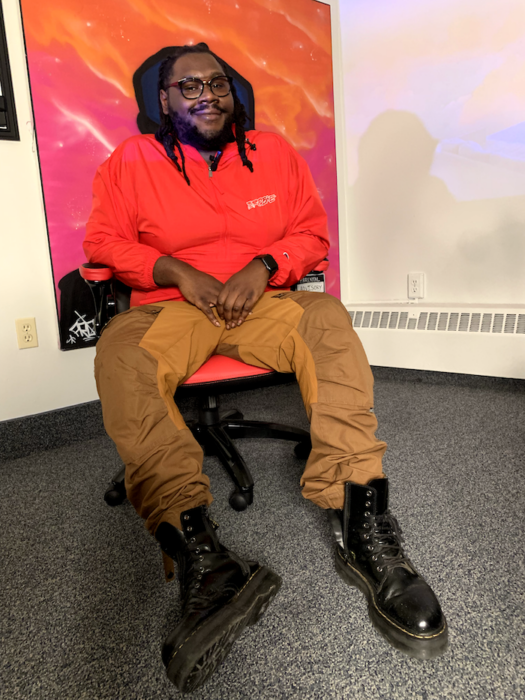
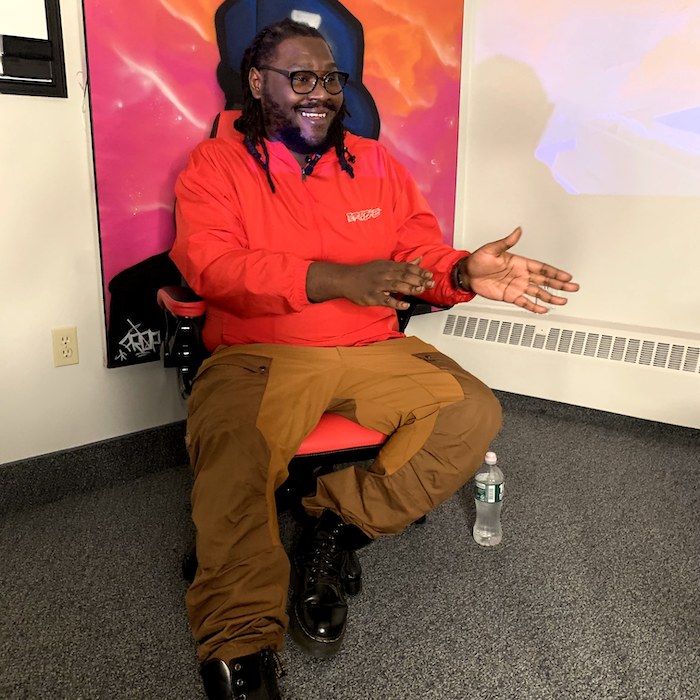
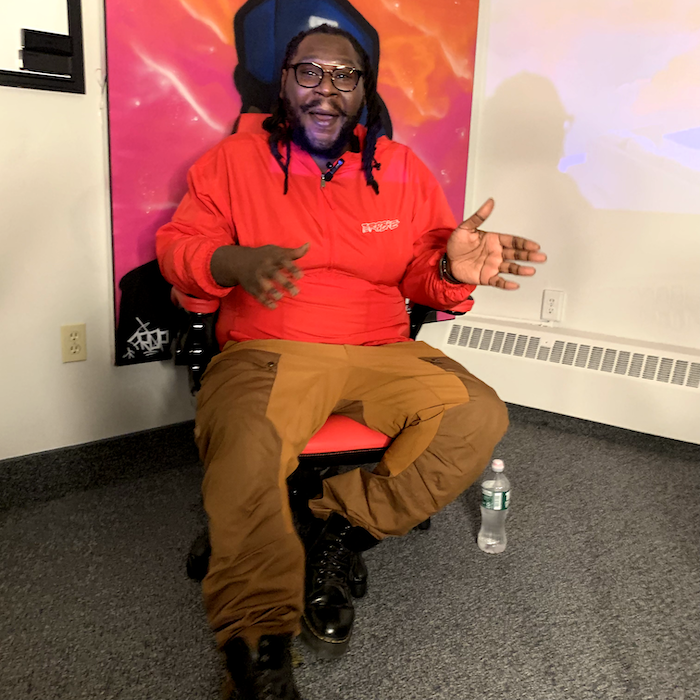
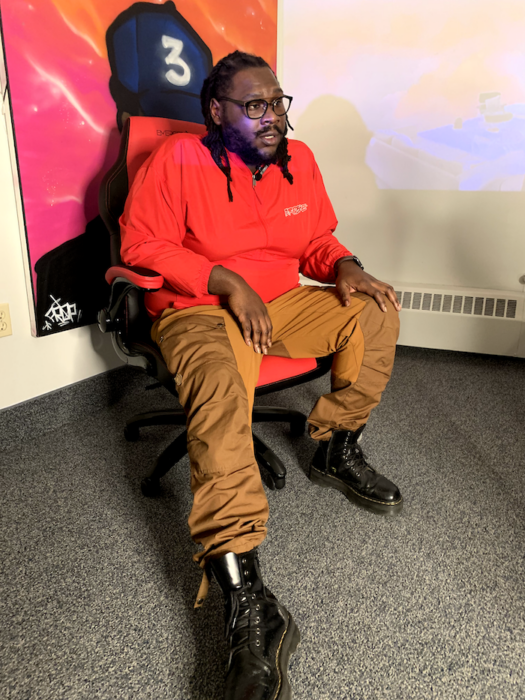
Perry’s debut Tiny Trap Concerts preroll was a collab with the Cummington-based JustinCredible Cultivation. He described the product as an herbal answer to a t-shirt you might purchase at a concert to bring home with you. Moving forward, with a new season of TTC “Reloaded” on the horizon, Perry will work with artists ahead of album release dates, then push each collaborative product—a Nack Pack with Estee Nack, for example—for three to four months. Artists will get a share of the profits, plus advertising for their latest outing via links and labels.
“There are some people who are trying to break into the industry,” he said, “whereas I see it as an opportunity to break out of the industry. … The industry itself has become a huge circle jerk. Everybody knows what’s going on, but they won’t really talk about it because they have their own thing going. But the customer is left just kind of searching endlessly for the shit, and if you can find a way to grab the customer and keep the customer, then you can tell them what the shit is, because you are the shit.”
In establishing his first brand separate from TTC, Perry drew inspiration from a fellow well-known canna culture figure, the Queen of Terpenes. He started calling her TerpBae after they met online around 2020, and she encouraged him to lean into the moniker. When he finally decided to take the plunge, Perry put TTC “on ice for a minute,” and shifted his mission to “take this level of access that I had to pitch something new.”
“I’ve been watching all of these companies—Her Highness, Miss Grass, and even Cookies—move around the country without licenses on the strength that they have developed brands that are strong enough for license holders to attach themselves to them,” he said. “I decided to go that route.”
The concept came to him as organically as organic gets—stoned, in couchlock position.
“One day I was watching an endless marathon at Baywatch, and TerpBae and Baywatch kind of happened phonetically in my head,” Perry said. “I’m a big fan of nostalgia. If you look at the Tiny Trap Concerts stuff, the logo is like all old-school WWF-style, and our ads and promo have some mix of wrestling [and other retro themes]. … I was looking at things that have impact and things that were dope, but also things that lack diversity.”

In order to finesse and synthesize the throwback orange, red, and yellow colorway, Perry leaned on the Hub-based AOA Supply, a community and graf-minded collective known for clever and edgy visual art projects and installations. “We’re developing a company where you can look left and right to a team of artists that you trust and develop concepts with,” he said. “[AOA] is helping me bring all of my ideas to life.”
If there is a theme to TerpBae that runs deeper than the Hulkamania hue, and is reflected in their TerpBae Athletics spinoff, it’s an aspiration to connect across the board. “It may come with a bit more pop, but [TerpBae] is for everybody,” Perry said. “[It’s] a Black-owned brand, but we’re not trying to sell weed specifically to Black people.” At the same time, he added, “I would like to see more Black-owned brands. Being one of the few sounds cool in the moment, but it’s a huge struggle when you don’t have others with you. If enough of us pressure these dispensaries to have Black-owned sections on their menu, then there’s a lot more room for all of us.”
For Perry, the idea is to get as many people under the same tent—one bearing the TerpBae logo, possibly on a beach, designed by the AOA crew, with a Tiny Trap Concert popping off underneath.
“My customer is the person who walks into a dispensary in a pair of Jordans,” he said. “My customer is a person who walks into a dispensary in a pair of Vans, or a customer who walks into the store wearing whatever they walked out of the house with.
“My customers are everybody.”

























